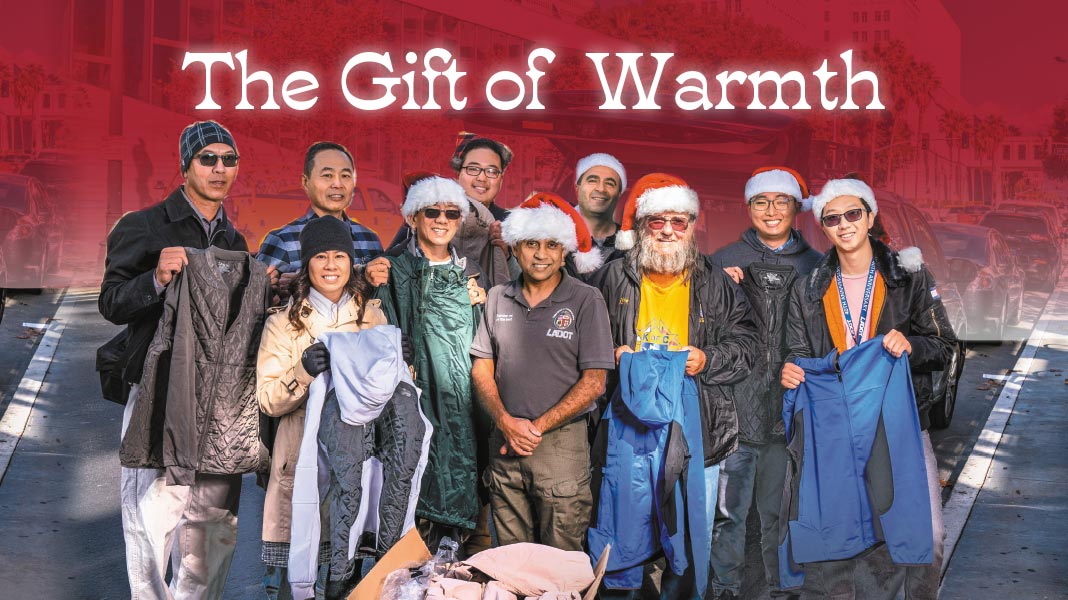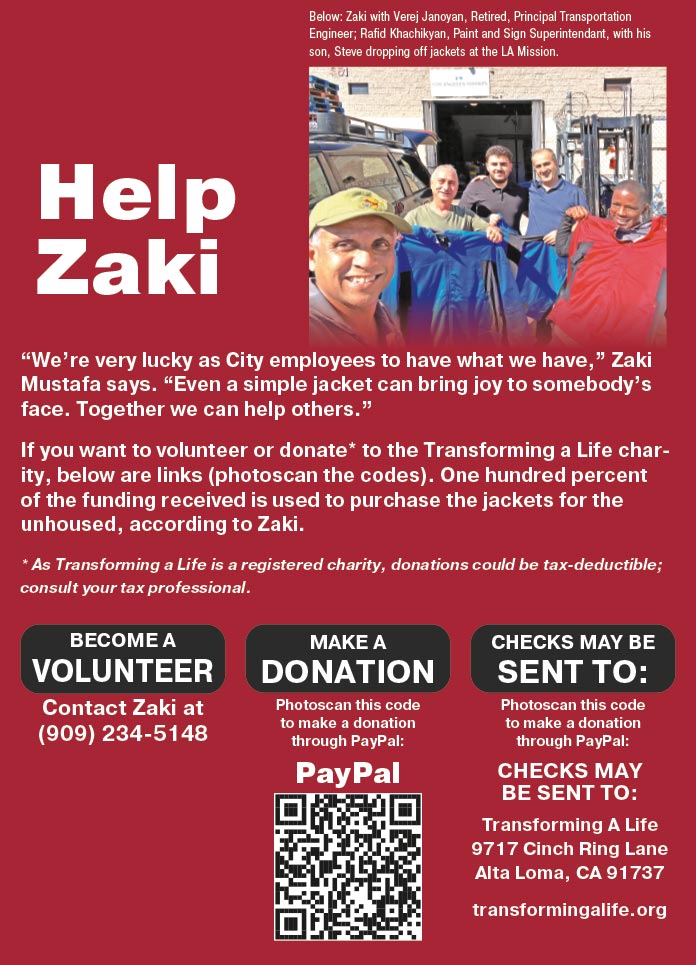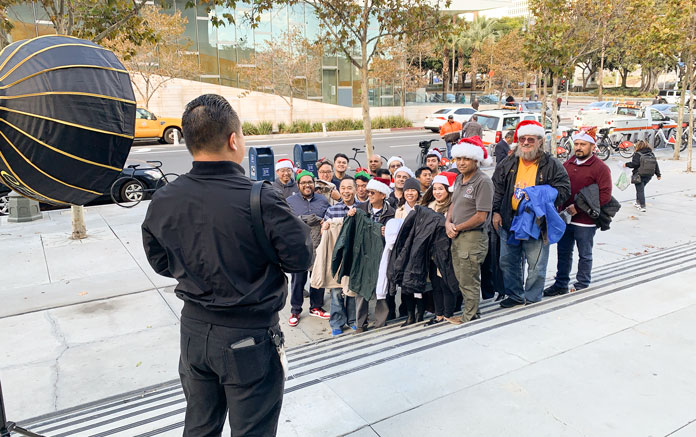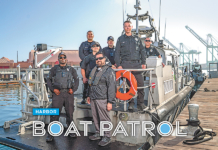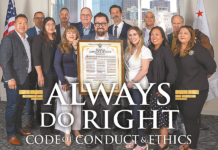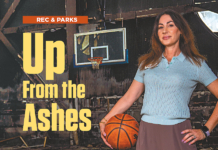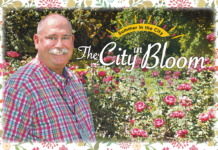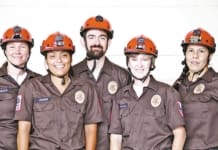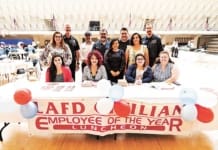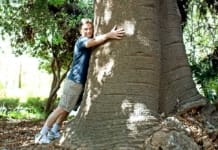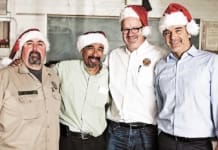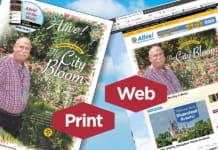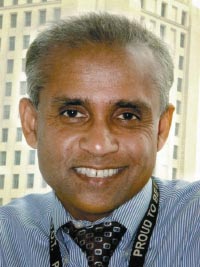
All it takes is one transformative moment.
For Zaki Mustafa, Retired Executive Officer, LADOT, 33 years of City service and Club Member, that moment came while walking from Union Station past City Hall early one morning six years ago. He was on his way to work.
He passed an unhoused person shivering in front of him, and Zaki gave him literally the coat off his back – a new jacket his wife had gifted him. He couldn’t get that man out of his mind, so he started giving away more jackets.
With his wife, Loretta, he formed a nonprofit. He raised money any way he could. He organized shipments of jackets on his lawn. He wore out the family van. He reached out to organizations that could help him. Many of his colleagues from LADOT gave up their early hours and lunch hours to help him. (The LADOT is not officially connected to his charity.) Then other volunteers came by the dozens, and then by the hundreds.
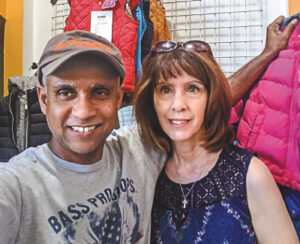
When funds got low, he reached out to Alive!, and we ran a small story on his charity, called Transforming a Life. That outreach raised several thousand dollars, and he was back in business.
Today, Transforming a Life’s Jackets for the Homeless campaigns have given away more than 55,000 jackets.
During this season of giving, when so many have so little, the Club once again features Zaki and his nonprofit for inspiration, for good news, and to give Club Members a chance to join him and help those in need.
Representatives of the City of LA at the ceremonial transfer of the keys to the RTX in May were (from left) Councilmembers Monica Rodriguez and Mitch O’Farrell; Mayor Eric Garcetti and (in chief’s hat) Fire Chief Kristin Crowley.Capt. II Darius Cunnigan (center) and Michael Dunbar, Equipment Engineering Specialist II (right) display the RTX’s ample equipment storage space to Club CEO Robert Larios.
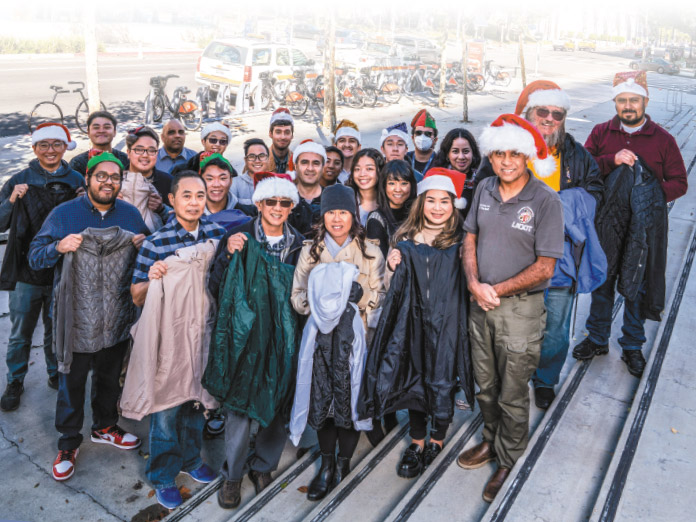
‘We have an army of more than 600 people who help. Some people say that others [in the world] don’t care. That’s not the case.’
— Zaki Mustafa
| THANK YOU!: The Club thanks Zaki Mustafa, the dozens of LADOT volunteers who help him organize and distribute jackets to the poor; his wife, Loretta; and all those in the City of Los Angeles who help improve the world. We are honored to know you and give you the spotlight you so deserve. |
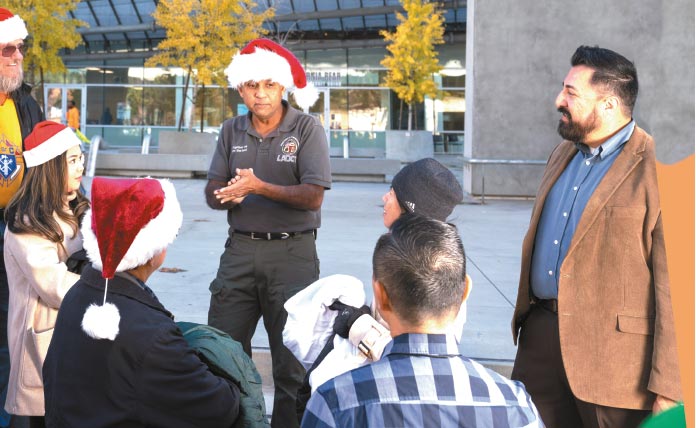
Transforming the Lives of The Needy, and Zaki, Too
On October 24, Club CEO Robert Larios and Alive! editor John Burnes interviewed Zaki Mustafa, Retired, Executive Officer, LADOT, 33 years of City service, Club Member. Alive! talked to Zaki about the charity he manages, Jackets for the Homeless. The interview took place via Zoom.
Q: Hi, Zaki. Good to talk to you again!
Zaki Mustafa: You too!
Q: I think the last story we did about you was when you retired – the City Council gave you a beautiful sendoff.
Zaki: Right. That was 2017. You know what’s really bizarre? My son works for city of Riverside; he’s the deputy Public Works Director. [Former LA Mayor] Antonio Villaraigosa is now in charge of infrastructure construction for the state of California, and he came to inspect the projects in Riverside. My son asked him, “Do you remember my dad? Villaraigosa and Councilman Mike Bonin and [the late] Councilman Tom LaBonge gave me the “Yes” award. I think you did a story on that too.
Q: Pretty sure, yes.
Zaki: So Villaraigosa says back to him, “I remember. He’s the guy who took the Yes award!” He remembered. Pretty incredible.
Q: So how’s retirement going? Since you retired, Zaki, what have you been up to other than this huge charity project, which we’ll get to in a minute.
Zaki: Well, we set up the livestreaming of Mass in our church. We were the first one to broadcast in our Diocese of San Bernardino. On Thursdays, my wife and I babysit our grandson; that’s our first priority. But on Mondays, Tuesdays, Wednesdays, Fridays, Saturdays and Sundays, it’s jackets.
Q: That’s every other day of the week.
Zaki: Right.
Jackets for the Homeless
Q: Well, I guess that brings us right to the subject of your charity, Transforming a Life and its Jackets for the Homeless Campaign. When we last spoke, the charity had bought and distributed 45,000 jackets for those experiencing homelessness.
Zaki: I was wrong. So far this year it’s been another 8,000, with 3,000 more to go. That will be more than 55,000 given out since retirement.
Q: More than 55,000 jackets to the homeless?
Zaki: Yes.
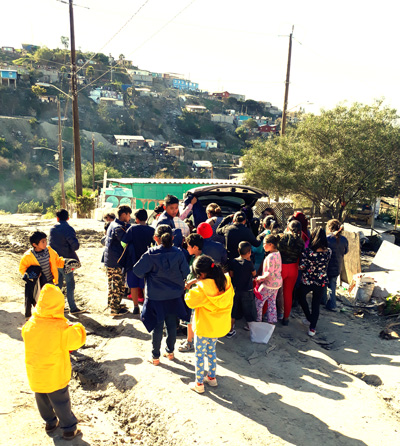
Q: Where do you distribute them? I think it started in downtown LA, and then out to where you live in San Bernardino, and in San Diego “ and Tijuana, Mexico.
Zaki: The jackets go to Oregon, Colorado, Arizona, Nevada, New Jersey, Virginia, North Carolina, South Carolina, Road Island, Wisconsin, Idaho, Montana, Nevada, Texas, Kentucky, Florida, Minnesota, and also Washington, DC. I’m sending a lot of raincoats to Florida because of the hurricane; they don’t need thick jackets, they need raincoats. I have guys today going to Indian reservations in Montana, I have guys going to Arizona also. All throughout the country. The last time I counted we had more than 600 volunteers helping us take these jackets out to different people and places throughout the country.
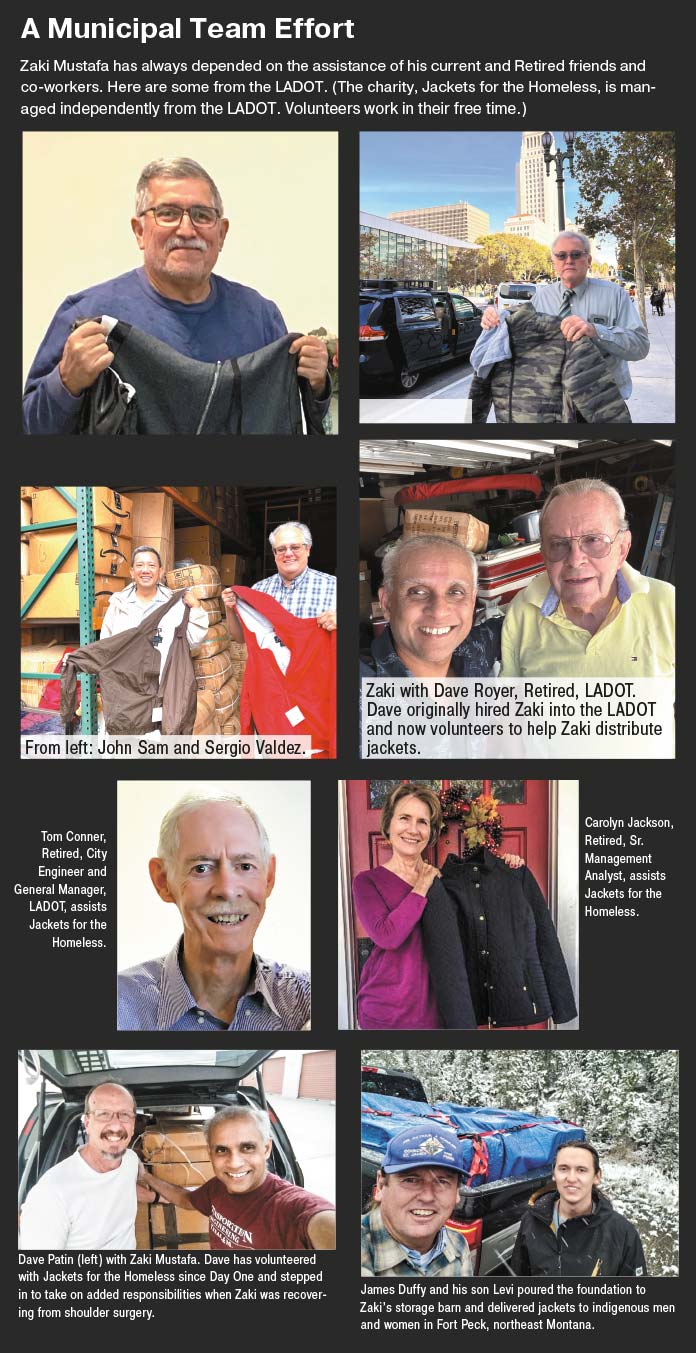
Q: That’s amazing. Let’s start from the beginning. Tell me the mission statement of this charity. What does it do?
Zaki: Well, it’s basic – to help people who are in need with clothing and also food. We just started the food about two years ago. In January and February, we do the food drive, and then we continue the jacket drive,… giving out jackets and trying to help people in need.
Q: How do you make the connections, Zaki, to these other cities, the other places around the country?
Zaki: Through my friends; from my professional organization, the Institute of Transportation Engineers; and through the Knights of Columbus. A lot of them come through Facebook, too.
Q: Right. How did it start? Pretty organically?
Zaki: Yes, simply. In 2016, before retirement, my wife gave me a nice leather jacket. I had wanted one. I took the train (Metrolink) or the bus to work every morning in downtown LA. I was exiting Union Station at 5:45 a.m. as usual. I was walking, and I came across this guy who was buck naked in front of City Hall. So I gave him my jacket.
Later, when I was still employed by the City, I got to serve as the international president for the Institute of Transportation Engineers, which consists of all the transportation planners, traffic engineers and city engineers throughout the country. I was the international president, and I was always raising money for student scholarships. We raised more than $700,000 for student scholarships. Anyway, after I gave that jacket up, my wife said, “You’re always asking for money from your friends at these conferences. Why don’t you ask them for money for the jackets?” So I put it up on Facebook that we were raising money for jackets for the homeless, and within a week we had about $3,500.
After we raised the money, I went shopping in downtown LA in my suit and tie of course. I was walking from shop to shop. I walked into this lady’s shop. I told her what I was doing, and she started crying. I said, “What happened?” She said, “I feel guilty about driving my Mercedes, I feel guilty about what I have. I heard a message from our bishop on the Year of Mercy yesterday, and you show up today. But I don’t want to give them money because they’re going to go buy drugs with it.” She gave me a couple hundred jackets for free, and she showed me how much it would have cost – four or five or six dollars each. I brought those back to my office.
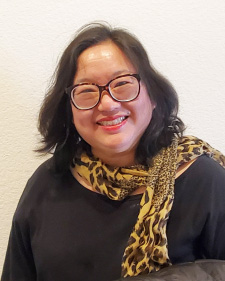
During Valentine’s week in 2017 we gave away those jackets around City Hall. I didn’t think much of it. In April, our accountant, Miranda Ow, from my Bureau for the office came into my office first thing in the morning and threw a stack of paper on my desk. When a staff member does that it’s usually a complaint or something. So I said, “Miranda, what is this? Some sort of grievance?” She said, “No, I was washing dishes Friday night and God told me to do this.” “To do what?” She said, “This is the nonprofit that you and your wife are going to start after you retire. This is the paperwork that will get it started.” So we filled out the paperwork and turned it into the IRS. Miranda came up with the name, and the logo is the one that John Hawkins [City Employees Association CEO] came up with. After we applied, I got a letter from the IRS, saying, “Hey, you messed up something. Who pays for all other expenses because your application says that 100 percent of what you collect from your fundraisers goes to the cause? How are you going to run the nonprofit?” I explained to them that’s our donation – my wife and I donate that because we were going to have a good retirement plan from the City.
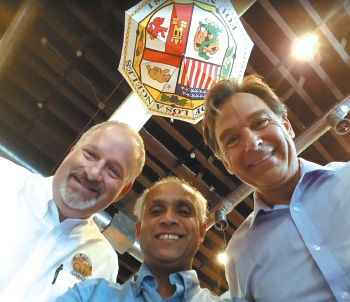
That’s how it started, but the connection was first through that Institute of Transportation Engineers. The engineers donated a couple hundred dollars here, a couple hundred dollars there, and then they donated the money for shipping, which was more expensive than the actual jackets.
Q: A natural beginning.
Zaki: Right. And then about four years ago, I was going around trying to find a shipping company that would give me a discount. At one shop, the lady said, “Okay, set up your pallet in the back and we’ll give you 50 percent off.” I went in the back, and then she says, “Where is your pallet?” I tell her, “Everything’s in the van.” She said, “We only deal with people who bring in their pallet.” I said, “I’m sorry, but I promised this shelter back East they’re going to have the jackets.” And she said, “This is your last time.” I told her the story again, and then this guy from the back comes in, grabs my paperwork and said, “From now on, all your shipping is free.”
Q: Incredible.
Zaki: To answer your earlier question, it’s friends from throughout the country who have been helping me. I have a lot of people who donate who don’t give out the jackets, so I just divvy it up and give it to other groups. We have Kiwanis from back East supporting us; Baptist, Lutheran and Catholic churches; the Knights of Columbus; the Order of Malta; St. Vincent de Paul; the Boy and Girl Scouts; and now it’s by word of mouth. They see us on Facebook and call, saying, “Hey, we have a shelter.” Or I’ll get a call from people saying, “We have a family that really needs the jackets. Can you ship it to me, or can you send it to me?” For those, they pay for shipping because those are one or two jackets, or they’ll come to my house and get it, and they’ll give it out to those families.
Q: All from giving one jacket to a man outside City Hall.
Zaki: I gave out the jacket that my wife had given me. My rule is, if I give out a jacket, it’s the kind of jacket you’ll see me wearing for the season. I want to make sure I give something that I can wear myself.
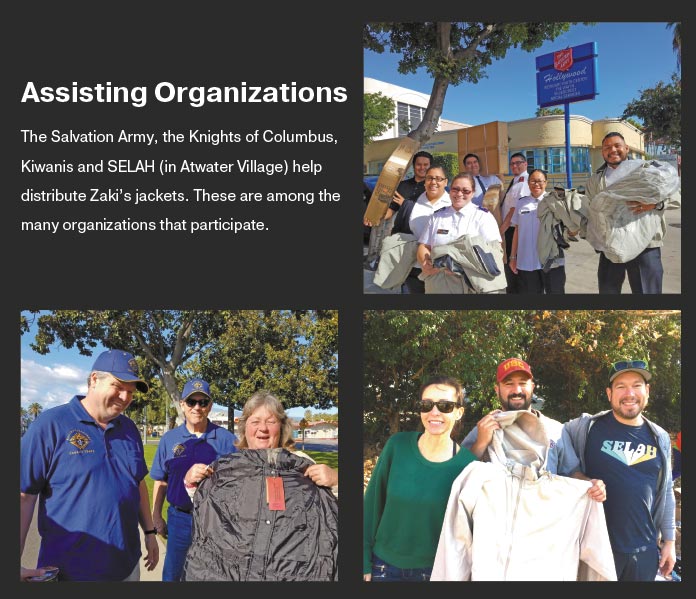
Challenges, and Fate
Q: A few years ago, things got tough for you and your charity. How did you get through that?
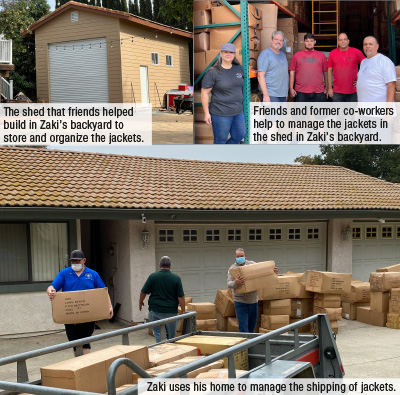 Zaki: It was about the time when I had rotator cuff surgery, and the doctor told me, “You’re not going to be able to lift any boxes for this year.” That was around April. “It’ll be next year or maybe later that you might be able to lift boxes,” he said, and I was really down about how I would get the jackets distributed. Also going on at that time, I took out a home equity line loan for about $50,000 so I could buy the jackets. It was a lot of work for one or two people to collect all these checks, to log it in, to cash it, to reconcile it, and then to collect the money back to pay the loan. Now, the vendors downtown know me and are okay with the fact that I haven’t paid them yet. But before, when the fundraising was down, they didn’t know me yet. And my shoulder was not healed. But then John Hawkins put a little blurb about my fundraiser in Alive!, and all of the sudden things started moving in the right direction again. I had what I needed, and I found another doctor who did surgeries on the Lakers and was on the sports scene. I went to that doctor, had the surgery, and I was lifting boxes by September. It was amazing how those two things happened when I needed them to.
Zaki: It was about the time when I had rotator cuff surgery, and the doctor told me, “You’re not going to be able to lift any boxes for this year.” That was around April. “It’ll be next year or maybe later that you might be able to lift boxes,” he said, and I was really down about how I would get the jackets distributed. Also going on at that time, I took out a home equity line loan for about $50,000 so I could buy the jackets. It was a lot of work for one or two people to collect all these checks, to log it in, to cash it, to reconcile it, and then to collect the money back to pay the loan. Now, the vendors downtown know me and are okay with the fact that I haven’t paid them yet. But before, when the fundraising was down, they didn’t know me yet. And my shoulder was not healed. But then John Hawkins put a little blurb about my fundraiser in Alive!, and all of the sudden things started moving in the right direction again. I had what I needed, and I found another doctor who did surgeries on the Lakers and was on the sports scene. I went to that doctor, had the surgery, and I was lifting boxes by September. It was amazing how those two things happened when I needed them to.
Q: Amazing.
Zaki: Here’s another one. Last year, my friends came over to our house and saw that it was full of jackets. They were everywhere – the garage, another room, and a small storage shed. Everywhere.
Q: You were processing all of it at your house?
Zaki: Yes. That’s when one of my friends came in and poured the foundation for a new barn, and another friend of mine volunteered to do the framing. Some of the materials were donated, too. That’s how that barn was built.
Sometimes I wonder why are we doing this. It’s a lot of work. We could be just sitting here enjoying retirement. But my wife and I feel it’s time to give back.
Q: It’s a great cause. But people believe in you, too.
Zaki: The gentleman who was in charge of Caltrans District 7, Mike Miles, came to one of my events, and he said, “I’d be just sitting home sipping coffee and doing nothing. I have a good retirement. I’m going to join you.” He’s also helping me.
Q: Great.
Zaki: Two years ago in January I got a call from a guy saying, “Hey, I want to donate $50,000.” I said, “My nonprofit was set up for only $49,999. I can’t take that much.” The guy says, “We’re a bunch of lawyers and CPAs. We’ll take care of all the paperwork for you, and we’ll even do your taxes from now on.” I was doubtful. I said, “Yeah, sure.” Four months later, I got a letter from the IRS saying that the limit had been removed.
And our old van that we used to move the jackets was the one we used for the kids growing up. It was tired and breaking down. This is how fate also comes in – in December the week before Christmas a few years ago, the back hatch stopped working. It had 280,000 miles on it. We needed a new one. I started looking for a van on Craigslist at that time, and I found this four-wheel drive van, a Toyota Sienna. The guy was asking $24,000. I called him and he said he was in Hong Kong. I thought it was a scam. But he called me back a few days later with his attorney after checking me out. I thought, attorney? What’s going on? He said, “You’re the guy who screwed up traffic in LA!” Apparently he wasn’t a fan of my work with LADOT! But he liked most of the bike lanes we installed in neighborhoods. Then he said, “Come by the house and pick up the van. It’s yours.” He donated it to us.
It was one thing after another. It’s amazing how things work out to help others.
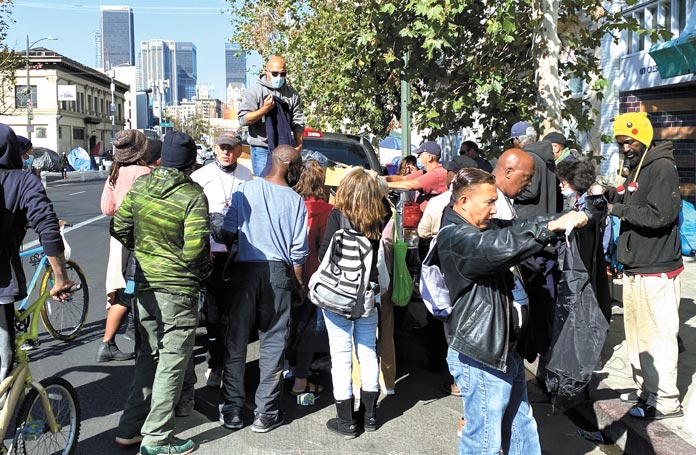
Shelters
Q: You still give jackets away directly to those who need them, but you’re increasingly working with shelters.
Zaki: We try to limit giving out on the street. We’re going to Skid Row I think again in a few weeks. I like to give the jackets directly to the shelter. I want homeless people to take advantage of the shelters. Shelters have so much to give.
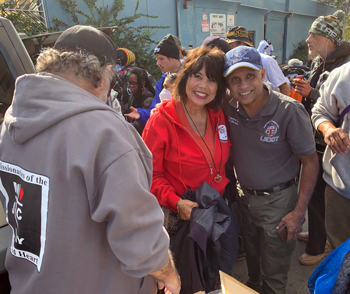
It really breaks my heart to see how the City is right now. I was in charge of construction and maintenance and engineering for LADOT. I got to drive in the City all the time when I was working. The homelessness, the encampments, at every single corner now didn’t exist when I was working, and it breaks my heart to see the condition that our beautiful city is in.
I think it’s better for us to encourage people to go to the shelters. It’s really critical that we build all these shelters that we’re talking about building to help the homeless.
LADOT Employees
Q: I remember when you were still working for Transportation, a number of your colleagues there helped you distribute jackets before work.
Zaki: At that time, the first distribution was done right before we started work. That was when we did the very first distribution. And we started distributing at lunchtime, too. They would even come in on their day off.
I’m retired, but a number of LADOT people still help out. They’re still involved.
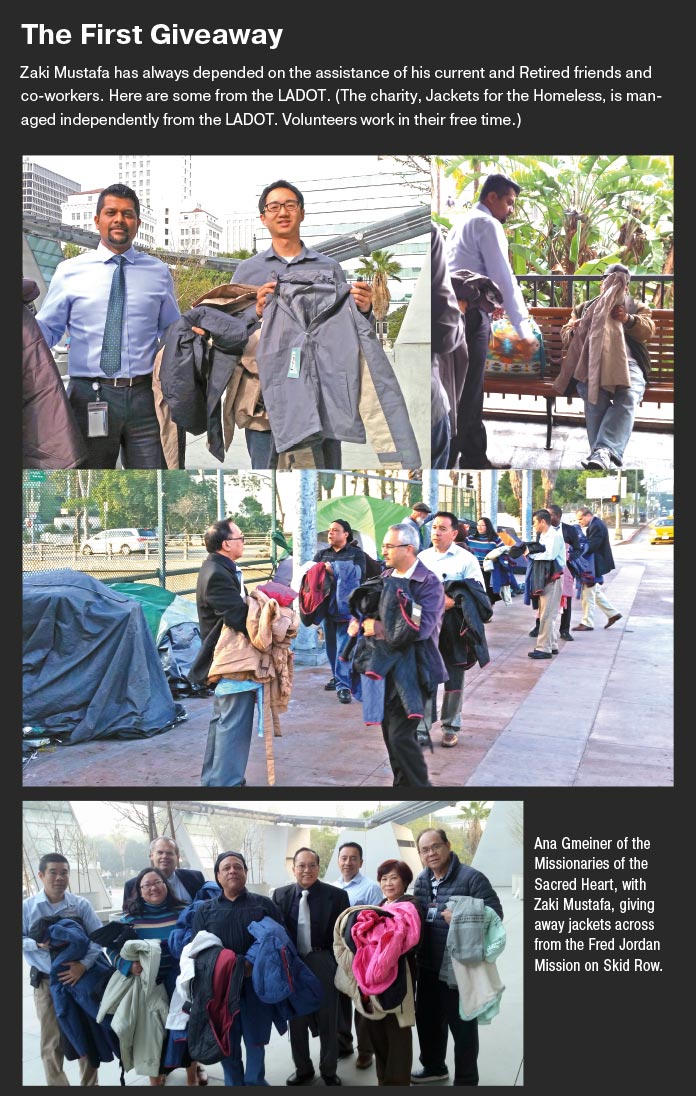

Holiday Giving
Q: Is Jackets for the Homeless active during the holiday season?
Zaki: Yes. We have a lot of giveaways during the Christmas season. There are events throughout the States giving out jackets and coats to our friends in need. We’ll be active for sure.
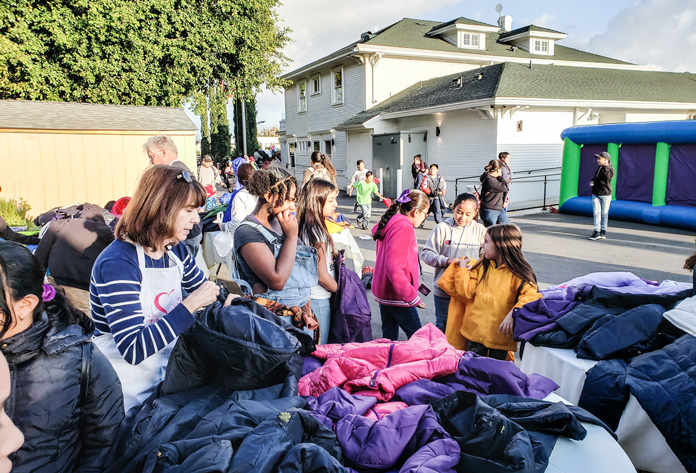
The Meaning of It
Q: What does giving these jackets away mean? What kind of impact are they making on these people?
Zaki: We have to think about how lucky we are, how blessed we are, that we can come home to a house that’s warm and has heat. That one person sitting in front of City Hall, buck naked, was cold. You could see the goose bumps on his body.
There was another lady under the bridge at the LA Mall. Lily was a permanent resident there, always there, and at night you could see she was cold. These jackets are for the truly homeless and people in need. They wear it for maybe a week or two, because after that it starts smelling. They have no way to wash them. Homeless people ask me about that. They say, “We’re going to throw it away because we can’t wash it. Why are you doing this?” Well, even if it keeps them warm for one day it makes my wife and me happy.
When I see those people, the smile on the kid’s face, that’s it right there. I get pictures back from the people who have given out those jackets, and you see those kids and adults. Yesterday, we went to breakfast. I had this couple drive to the state of Montana and give out jackets to the shelter there, and the man says, “I can’t believe how happy they were when they got that one jacket. It’s going to keep them warm when it starts snowing there.” That’s what gets me – when I see that smile on their face or when I the warmth they’re going to be getting by putting that on. I got a comment on Facebook from someone distributing jackets for us in St. Louis. It read: “The best part of my Saturday was this little angel. Joanne helped her try on several coats to find the perfect one. As she left, she gave me a hug and told me she loved me.”
Q: What do you love about what you do?
Zaki: That so many people want to help other people. It’s not Zaki or Loretta. Now we have an army of more than 600 people who want to help. There are so many nice people out there, so many, and they take the time to help out others. Some people say that other people are mean or don’t care. That’s not the case. There are so many nice people out there.
Just this weekend, a friend of mine from the engineering association is working with the City of St. Louis to hold a major jacket giveaway. He raised the funds, and I’m sending the jackets. There’s a Baptist church in North Carolina doing the same thing, partnering up with the local governmental agency to work with the shelters to give out coats to the people. Friends from all over the States will have given out thousands of jackets along with hundreds of locations within our state, making it more than 12,000 jackets to our friends in need just this year.
That’s what really gets me – seeing how many people are out there helping others. When I first started, it was how many jackets were are giving away, and how much could I raise. That’s not what I think about any more. It’s how many people can I get to help others.
Q: How long will you be doing this?
Zaki: My wife and I are both 62. We’ll be doing this until we can’t lift a box. We hope a long time.
Q: Zaki, thank you for talking to us, and for all you do for the less fortunate in LA.
Zaki: You’re welcome. I could not have done it if it weren’t for you guys at the Employees Club, either, for the logo and that very first story.
Q: Merry Christmas to you and Loretta.
Zaki: To you, too.
|
BEHIND THE SCENE
Club VP of Marketing Summy Lam photographs the all-volunteer team that assists Zaki Mustafa, Retired, LADOT, to distribute jackets to the needy. |


